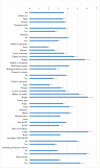What matters most for early childhood development? Evidence from Malda district, India
- PMID: 35657789
- PMCID: PMC9165910
- DOI: 10.1371/journal.pone.0268985
What matters most for early childhood development? Evidence from Malda district, India
Erratum in
-
Correction: What matters most for early childhood development? Evidence from Malda district, India.PLoS One. 2024 Jun 20;19(6):e0306034. doi: 10.1371/journal.pone.0306034. eCollection 2024. PLoS One. 2024. PMID: 38900769 Free PMC article.
Abstract
Background: The early period of a child's life is considered to be the most important developmental stage throughout the lifespan. Around 250 million children of age below five years in low-and middle- income countries (LMICs) are at risk of not attaining their developmental potential. A cross-sectional case study was conducted to assess the early childhood developmental (ECD) status and to investigate the factors influencing the same in Malda, India.
Methods: Information on 731 pre-school children aged 36 to 59 months was collected in 2018 using a structured questionnaire following a multi-stage, stratified simple random sampling procedure. ECD was measured following the UNICEF's Multiple Indicator Cluster Survey, which monitors early child development in LMICs. A path analysis using structural equation modelling was carried out to examine the relationship between possible associated factors and ECD status.
Results: It has been found that only about 25% of children are developmentally on track of literacy-numeracy domain of ECD. Although, in the other domains, the situation is better. Results of the path analysis revealed that there are certain proximal factors, i.e., home environment, mother's time for care, having home tuition and attending private pre-school, which are influenced by certain distal factors and subsequently affecting ECD. The total effects revealed that place of residence (urban or rural) affects ECD mostly (Coef. -0.87, p = <0.001) directly or via mothers' time for stimulating activities, home environment and having home tuition for children. Further, it revealed that private pre-schools (Coef. 0.76, p = <0.001) and home tuition (Coef. 0.43, p = <0.001) also play a significant role in ECD.
Conclusion: Urgent attention from policymakers or other stakeholders is needed to promote ECD for the betterment of children and society of Malda district. In addition to that, special attention needs to be given to the children who belong to Muslim families, socially deprived communities and living in rural areas.
Conflict of interest statement
The authors have declared that no competing interests exist.
Figures




References
-
- Shonkoff JP, Richmond JB. Investment in Early Childhood Development Lays the Foundation for a Prosperous and Sustainable Society. Encycl Early Child Dev [online] [Internet]. 2009;1–4. http://www.child-encyclopedia.com/sites/default/files/textes-experts/en/...
-
- Lo S, Das P, Horton R. Early childhood development: the foundation of sustainable. 2016;(2011):9–11. https://ac.els-cdn.com/S0140673616316592/1-s2.0-S0140673616316592-main.p...
-
- Lu C, Black MM, Richter LM. Articles Risk of poor development in young children in low-income and middle-income countries: an estimation and analysis at the global, regional, and country level. Lancet Glob Heal [Internet]. 2016;4(12):e916–22. Available from: www.thelancet.com/lancetgh - PMC - PubMed
-
- Knudsen EI, Heckman JJ, Cameron JL, Shonkoff JP. Economic, neurobiological, and behavioral perspectives on building America’s future workforce. Proc Natl Acad Sci [Internet]. 2006. Jul 5;103(27):10155–62. Available from: http://www.pnas.org/cgi/doi/10.1073/pnas.0600888103 - DOI - PMC - PubMed
-
- Irwin L, Siddiqi A, Hertzman C. Early Child Development: A Powefull Equalizer. Final Report [Internet]. Geneav; 2007. https://www.who.int/social_determinants/resources/ecd_kn_report_07_2007.pdf

